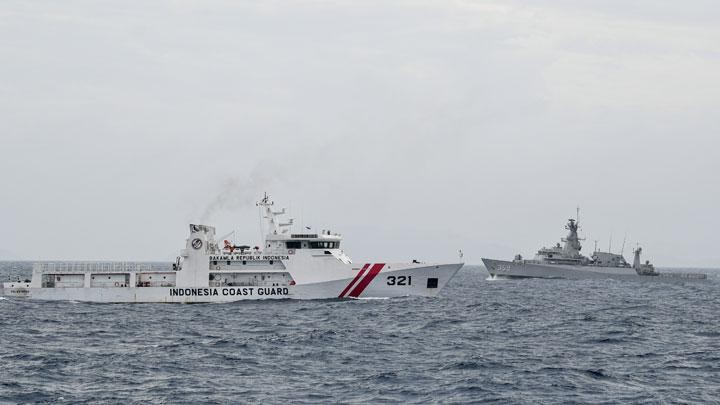Popular Reads
Top Results
Can't find what you're looking for?
View all search resultsPopular Reads
Top Results
Can't find what you're looking for?
View all search resultsIndonesia joins neighbors in protesting Beijing’s claims in South China Sea
Change text size
Gift Premium Articles
to Anyone
I
ndonesia has rejected China's sweeping claims in the South China Sea, following in the footsteps of its Southeast Asian neighbors, which have lodged similar concerns with the United Nations.
In a letter sent to the UN secretary-general last week, Indonesia reiterated its long-standing position that it was not party to any territorial disputes in the South China Sea, while maintaining that China’s historic claim to the sea “clearly lacks international legal basis".
Indonesia is the only nonclaimant state in Southeast Asia that sent such a letter of protest, although its exclusive economic zone (EEZ) in the North Natuna Sea is located adjacent to the highly disputed waters.
Jakarta said such a letter, however, was not unprecedented, because similar exchanges of views also happened in 2009 and 2010 at the UN Commission on the Limits of the Continental Shelf (CLCS), after Vietnam and Malaysia submitted a joint request for an extension of the continental shelf in 2009.
“Indonesia was only reiterating the position that China already knows. There are no new elements [in Indonesia’s position],” the Foreign Ministry’s director general for legal affairs and international treaties, Damos Agusman, told The Jakarta Post on Friday.
“But [Indonesia’s position] needs to be registered with the UN, because China also conveyed its position over its [territorial] claims -- which indicated [that it also has] claims to Indonesia's exclusive economic zone [EEZ]. This is purely a matter [of] procedural propriety."
Indonesia is not a claimant in the South China Sea territorial disputes and has rejected Chinese efforts to bring Indonesia to the negotiation table regarding potential overlap with Indonesia's EEZ in the North Natuna Sea.
Indonesia and China were involved in a diplomatic spat earlier this year over the latter’s coast guard and fishing vessels operating in Indonesia’s EEZ in the North Natuna Sea, which borders Vietnam and Malaysia.
Unlike territorial waters and their link to sovereignty, an EEZ covers international waters 200 nautical miles out from a nation's coastline and confers the coastal state exclusive rights to exploit marine resources in the designated area, according to the UN Convention on the Law of the Sea (UNCLOS).
Indonesia has said that its exclusive rights in the EEZ were conferred to it by the UNCLOS, to which China is also a party and to which it is legally bound.
Read also: ASEAN reaffirms international law as basis for sovereignty in South China Sea
China claims most of the South China Sea despite the great distance from its coastline, but a 2016 international tribunal ruled in favor of the Philippines and invalidated China's sweeping claims that are disputed by the Philippines, Vietnam, Malaysia and Brunei.
China has rejected the ruling and continued to build and militarize artificial islands as part of its sweeping claims over the South China Sea, causing anxiety among Southeast Asian nations.
In December last year, Malaysia submitted to the CLCS a request to extend its continental shelf area in a segment of the South China Sea, a move that Beijing immediately protested at the UN. This was an individual partial submission by Malaysia, after Vietnam and Malaysia had made a joint submission in 2009.
Beijing insisted that it had historic rights in the South China Sea and that Malaysia's submission "seriously infringed China's sovereignty, sovereign rights and jurisdiction".
The Philippines and Vietnam later also individually submitted letters of protest to the UN rejecting China’s territorial claims, with the latest being Vietnam in April this year.
Read also: Indonesia calls for parties to exercise self-restraint in South China Sea amid pandemic
In Tuesday’s letter to the UN, Jakarta said China's nine-dash line map implying its historic rights claim had no international legal basis, citing the 2016 tribunal ruling.
Jakarta sparked anger from Beijing in January following the kerfuffle around the North Natuna Sea by saying it would “never recognize China’s nine-dash line because it was contrary to UNCLOS in accordance with the 2016 tribunal ruling.” The citation of the legal defeat evoked a strong response from Beijing, which called the ruling “illegal, null and void” and said it would neither accept nor recognize it.
Damos said the ruling, however, did not require recognition from any country to be valid.
“A tribunal ruling remains a ruling, with or without support from states. It is still a ruling even if there is no state to give support to it. Because [the tribunal] derives its authority from UNCLOS, which has [received] consent from state parties,” Damos said.
Earlier this month, Foreign Minister Retno Marsudi called on all relevant parties to refrain from any action that might erode mutual trust and potentially escalate tension in the region, as negotiations for a code of conduct in the South China Sea were postponed due to the COVID-19 pandemic.
Qiu Xinli, political counselor at the Chinese Embassy in Jakarta, said his country was committed to respecting and acting in accordance with international laws, but would firmly defend its territorial sovereignty and maritime rights and interests in the South China Sea.
"China adopts a 'dual track approach', namely resolving territorial sovereignty disputes through [bilateral] negotiations and consultations with related countries based on respecting history and following international laws; and, together with ASEAN countries, maintaining peace and stability in the South China Sea," he told a virtual press briefing on Tuesday.
Editor’s note: This article has been updated with a response from Chinese Embassy.










